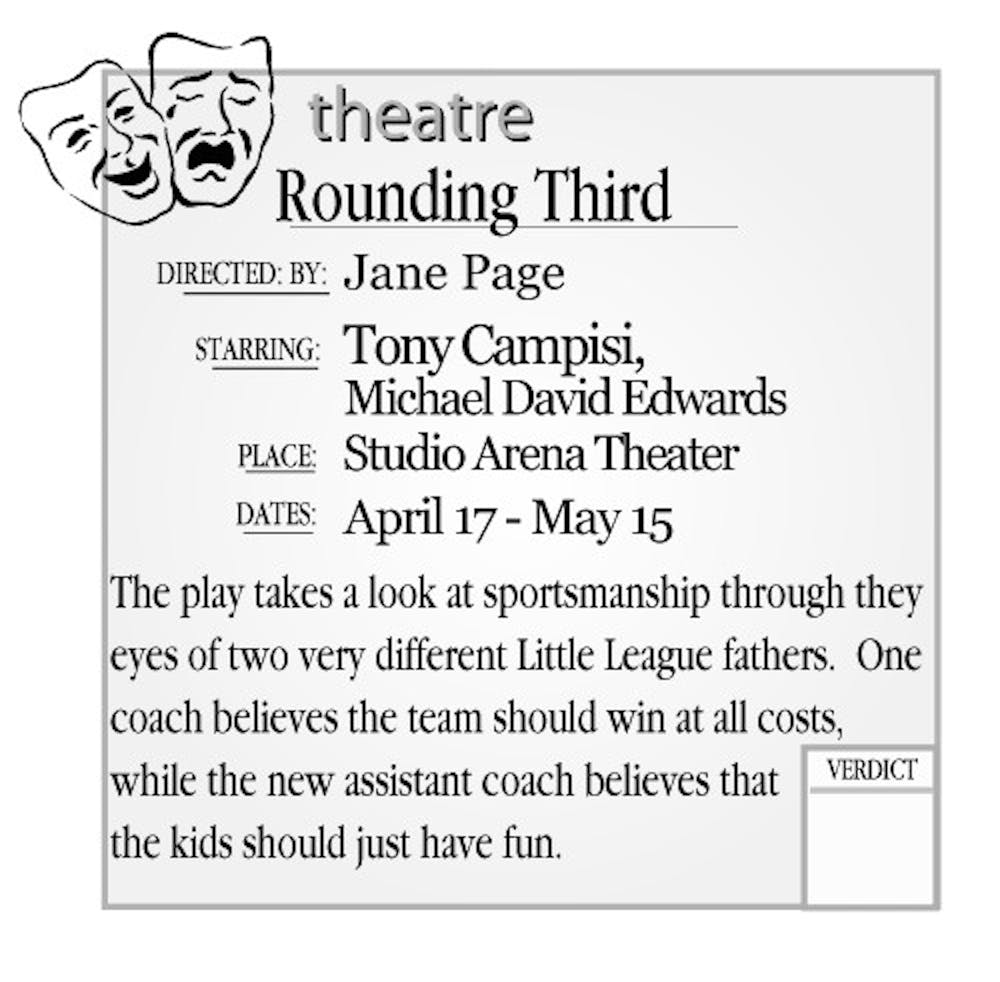Swing batter, batter!
That was the cry heard from Studio Arena Theater Friday night at the opening of the two-man play "Rounding Third," a baseball comedy written by Richard Dresser and directed by Jane Page. The play first opened Off-Broadway in 2003 at the John Houseman Theater in New York and has been a great success since. The play opened to the music of Bruce Springsteen's "Glory Days" and viewers were greeted by Buster Bison, mascot for the Buffalo Bisons, as part of the promotion of the play.
The stage was designed as a baseball diamond, complete with bleachers and home base. The dirt, with patches of grass growing up through the untrodden areas, added a realistic touch that allowed the audience members to feel like they were right back on the ball field of their youths.
The play is a real-life experience of the writer as his son returned home from baseball practice one day and told his father about the coach's new strategy to win the playoffs. The strategy was, when given the signal of a backwards baseball cap, the runner would slide into third and fake an injury. The coaches could then take him out of the game and replace him with a faster runner. Of course, this was used only for the slow kids.
"Coach, isn't that cheating?" asks Michael.
"No, that's called strategy," Don says.
The play takes a look at sportsmanship through they eyes of two very different Little League fathers, Don and Michael. Don, played by Tony Campisi, believes the team should win at all costs while Michael (Michael David Edwards), the new assistant coach, thinks the important thing is that the kids have fun.
"Rounding Third" raises some interesting questions about the ways we want our children to view competition and what we are inadvertently teaching our children about winning and the enjoyment of the game. "Wait 'til the end of the inning if you have to cry," instructs Don after a child is hit with the ball.
The play exploits the viewer's competitive drive to win versus the child's devastation if they don't live up to the athletic expectation of their parents, coaches and teammates.
The focus turns to the two men's socioeconomic status, their relationships and their childhood experiences on the playground. Michael being the nerd, a financially successful man who never got picked first while Don is the rugged, manly, athletic-but-poor house painter.
"You don't own baseball, Don, so let me and my son have a little piece of it," pleads Michael.
Michael comes complete with a nervous tic and a cell phone while Don has his own superstitions about not changing his socks or fixing his windshield while they are in the playoffs.
"Timmy's mom, she wants me," declares Don. "If I was single, it would be shock and awe."
Both actors were outstanding and humor was the definite draw of this play. The audience was delighted to see Don do the Macarena to warm up the kids for play. There were many impromptu coaches' meetings between the two men discussing each other's view of right and wrong. In a display of temper Don destroys Michael's cell phone after he receives a call at practice.
After the play, the audience was treated to hot dogs from a stand in the foyer. It created a little smoke problem but no one seemed to mind as they were downing their Wardynski dogs. The smell of popcorn filled the small theater and was given out compliments of the theater and the Bisons. The audience put up with the antics of Buster Bison through the meet-and-greet, intermission and hot dog frenzy.
It was funny, entertaining, and a good family play.




